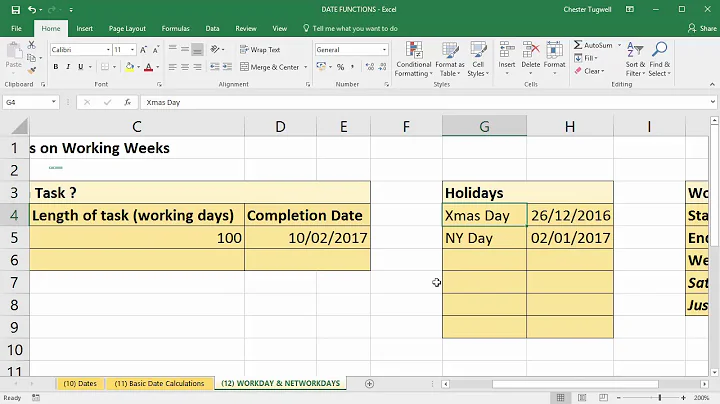How do I add to some date excluding weekends using SQL Server?
I had to tackle the same problem in my project. Gordon Lionoff's solution got me on the right track but did not always produce the right result. I also have to take in account dates that start in a weekend. I.e. adding 1 business day to a saturday or sunday should result in a monday. This is the most common approach to handling business day calculation.
I've created my own solution based on Gordon Linoff's function and Patrick McDonald's excellent C# equivalent
NOTE: My solution only works if DATEFIRST is set to the default value of 7. If you use a different DATEFIRST value, you will have to change the 1, 7 and (1,7,8,9,10) bits.
My solution consists of two functions. An "outer" function that handles edge cases and an "inner" function that performs the actual calculation. Both functions are table-valued functions so they will actually be expanded into the implementing query and fed through the query optimizer.
CREATE FUNCTION [dbo].[UTL_DateAddWorkingDays]
(
@date datetime,
@days int
)
RETURNS TABLE AS RETURN
(
SELECT
CASE
WHEN @days = 0 THEN @date
WHEN DATEPART(dw, @date) = 1 THEN (SELECT Date FROM [dbo].[UTL_DateAddWorkingDays_Inner](DATEADD(d, 1, @date), @days - 1))
WHEN DATEPART(dw, @date) = 7 THEN (SELECT Date FROM [dbo].[UTL_DateAddWorkingDays_Inner](DATEADD(d, 2, @date), @days - 1))
ELSE (SELECT Date FROM [dbo].[UTL_DateAddWorkingDays_Inner](@date, @days))
END AS Date
)
As you can see, the "outer" function handles:
- When adding no days, return the original date. This will keep saturday and sunday dates intact.
- When adding days to a sunday, start counting from monday. This consumes 1 day.
- When adding days to a saturday, start counting from monday. This consumes 1 day.
- In all other cases, perform the usual calculation
_
CREATE FUNCTION [dbo].[UTL_DateAddWorkingDays_Inner]
(
@date datetime,
@days int
)
RETURNS TABLE AS RETURN
(
SELECT
DATEADD(d
, (@days / 5) * 7
+ (@days % 5)
+ (CASE WHEN ((@days%5) + DATEPART(dw, @date)) IN (1,7,8,9,10) THEN 2 ELSE 0 END)
, @date) AS Date
)
The "inner" function is similar to Gordon Linoff's solution, except it accounts for dates crossing weekend boundaries but without crossing a full week boundary.
Finally, I created a test script to test my function. The expected values were generated using Patrick McDonald's excellent C# equivalent and I randomly cross-referenced this data with this popular calculator.
Related videos on Youtube
Paulinus P. Dwi Yulianto
Updated on June 04, 2022Comments
-
Paulinus P. Dwi Yulianto almost 2 years
For example:
@dtBegin = '2012-06-29' @input = 20I want the output to be
'2012-07-27'.-
Curtis almost 12 yearspossible duplicate of Add business days to date in SQL without loops
-
vergenzt almost 12 yearsSee this question. Edit: I'm pretty sure that question answers this one exactly.
-
 Hiten004 almost 12 yearsHave you seen this ? Using Dateadd() to ignore weekends : MSDN Article
Hiten004 almost 12 yearsHave you seen this ? Using Dateadd() to ignore weekends : MSDN Article
-
-
 Clockwork-Muse almost 12 yearsPossible candidate for a UDF, then;
Clockwork-Muse almost 12 yearsPossible candidate for a UDF, then;addWeekdaysor somesuch. -
 Martin Devillers over 11 yearsThis solution produces incorrect results: I.e. Adding 3 days to thursday 20 september 2012 should produce wednesday 26 september 2012. However, this function produces monday 24 september 2012.
Martin Devillers over 11 yearsThis solution produces incorrect results: I.e. Adding 3 days to thursday 20 september 2012 should produce wednesday 26 september 2012. However, this function produces monday 24 september 2012. -
 shawnt00 about 6 yearsUntested, but this might work in place of the
shawnt00 about 6 yearsUntested, but this might work in place of thecaseexpression if you like obfuscation!abs(ceiling(@input%5 + datepart(dw, @dtbegin)%7 - 3) / 3 * 3 / 2.0)) -
 shawnt00 about 6 yearsPerformance with functions can be slow so watch out since you've got those nested calls in there. Do you really need a table function?
shawnt00 about 6 yearsPerformance with functions can be slow so watch out since you've got those nested calls in there. Do you really need a table function? -
 Zohar Peled over 3 yearsI wouldn't attempt datetime arithmetics. It's too easy to mess it up
Zohar Peled over 3 yearsI wouldn't attempt datetime arithmetics. It's too easy to mess it up





